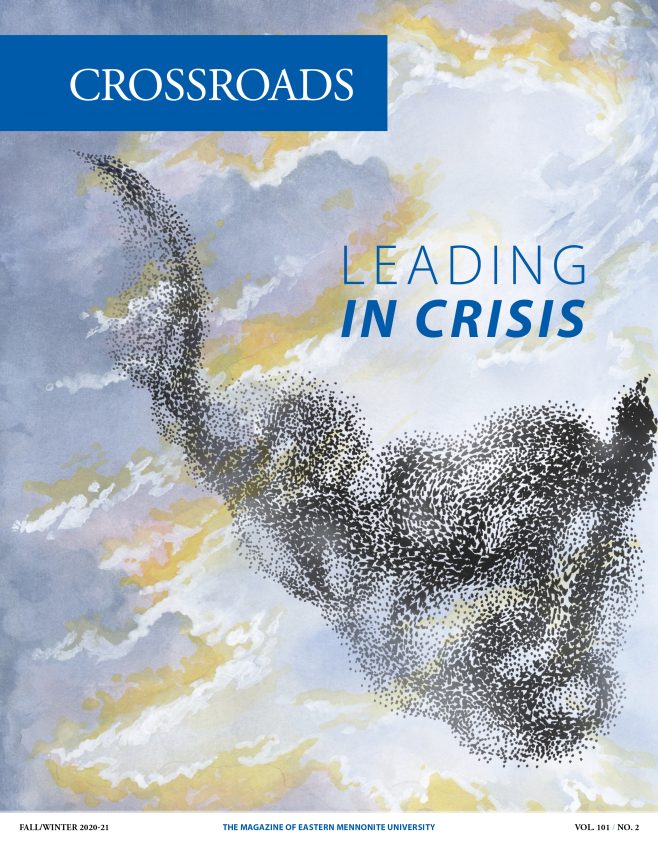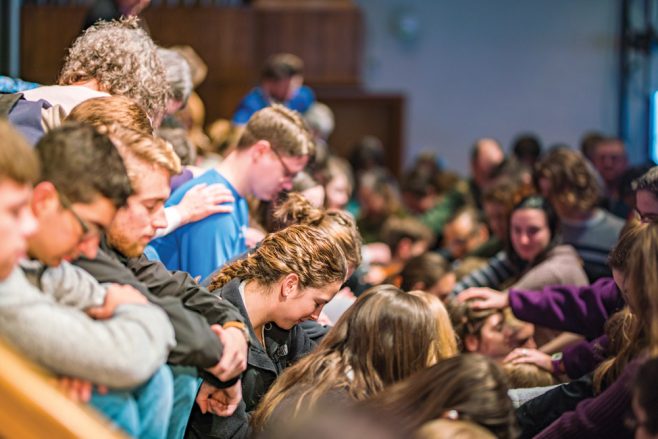
An EMU education includes experiential learning, mentorship, cross-cultural encounter and faith exploration with an emphasis on dialogue, peacebuilding, service and social justice — this distinctive legacy thrives in this community through our students. Daily, they share their many gifts and dreams and inspire us all. Read on and see how they lead by example, with faith and in the wonderous spirit of discovery.
LUKE HERTZLER
SENIOR BIBLE, RELIGION, AND THEOLOGY MAJOR
My junior year, I committed to pursuing a pastoral assistant role on campus, and it ended up being a significant step to my smooth transition into EMU as a transfer from Hesston College. I quickly created relationships through trainings and orientation, and overall I desired to observe the university’s atmosphere to see what spiritual needs the ministry realm could provide.
I chose to start up a small group called PLACE, which stands for prayer, listening, accountability, conversation and examination, but I also found great energy and hope from impromptu, vulnerable, authentic conversations with others … [Wanting to take] my in-the-classroom learning and test it out in an experiential practicum setting led me to the Ministry Inquiry Program, which placed me in two small Allentown, Pennsylvania, churches, joint communities I now consider a second home even though I only spent a summer with them.
My time in the Lehigh Valley I would describe with three categories: personal reflection (for instance, personal reflection on the slow work of God which beautifully can be observed in lives), community and relationships (being brave enough to start a conversation that matters, talking to people you know and to people you don’t know, talking to people you never talk to), and learnings and observations (how Sabbath is holy leisure: It is a sense of balance in life: activity and rest, work and play, sunshine and rain. It means the ability to carry on the activities of the day filled with the cosmic patience of God.).
There is so much more I could say, but I leave you with this: Ministry opportunities are ubiquitous all across campus and in our broader communities, and EMU provides many diverse opportunities for all disciples of Christ no matter what background or stage of life and no matter what interest or pathway. Let us live into this diversity in unity.
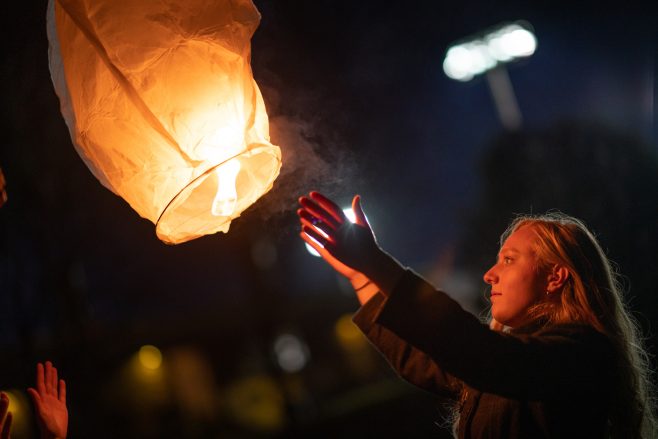
CAROLINE LEHMAN
SENIOR BIOLOGY PREMED MAJOR
I began my research experience here two years ago, as a sophomore. I was interested in the work of one of my professors at the time, Dr. Kristopher Schmidt, so I simply came to his office and asked if he needed a student for any of his projects. He immediately invited me to work with him on a project he was trying to start, and two years later, I have been able to see a simple question transform into beautiful piles of data, the beginnings of a paper, and a poster that we will present at an international conference in Washington D.C. this December.
I am certainly not the only student who has had such a positive research experience at EMU. Other students have had opportunities to travel to places like Hawaii, Peru and Guatemala to pursue their research questions, and with generous donor funding from the Kauffman- Miller grant, CT Assist, and others, more incredible opportunities continue to emerge each year. As I have begun to prepare myself for graduation and the next step in my education, I have been so grateful to feel well prepared and continue to be amazed by the plethora of distinctive, valuable learning experiences EMU has given me.
My education here has not only prepared me adequately for what is next, it has instilled in me a passion for learning and curiosity that I don’t believe I could have found anywhere else.
HOLLY MUMAW
SENIOR NURSING MAJOR
As I was getting a report from the nurses early one morning, it was brought to my attention that this particular patient seemed to have a history of excessive sedation, and takes high doses of opioids regularly at home for chronic pain. When caring for this patient, I wanted to go in without bias, presenting no external judgment, but found that the first thing she said to me after accidentally waking her up was, ‘Am I due for my pain medication? I’m in such terrible pain.’ … My mind started racing, going through the pros and cons of the ethical dilemma that I was faced with. I was questioning my definition of pain, as Professor Don Tyson always said, ‘Pain is whatever the patient says it is.’ How do I value that while also trying to keep the patient safe, while not writing the pain off completely?
I knew I wanted to talk to this patient and find out more about her and her personal story … She shared about her living situation, feelings of loneliness, isolation, the struggle with infertility, and continual grief that surrounds the word cancer. Through this interaction, I was able to build rapport and a bond with this patient that allowed for deeper vulnerability and trust. And what was even more interesting than that, she never asked me for pain medication for the rest of my clinical day. The concepts of the sacred covenant, specifically agape love, empowerment, grace, partnership and presence helped guide my care in this nurse-patient relationship.
TALA BAUTISTA
CJP GRADUATE STUDENT, FROM THE SUMACHER FIRST NATION IN KALINGA, PHILIPPINES
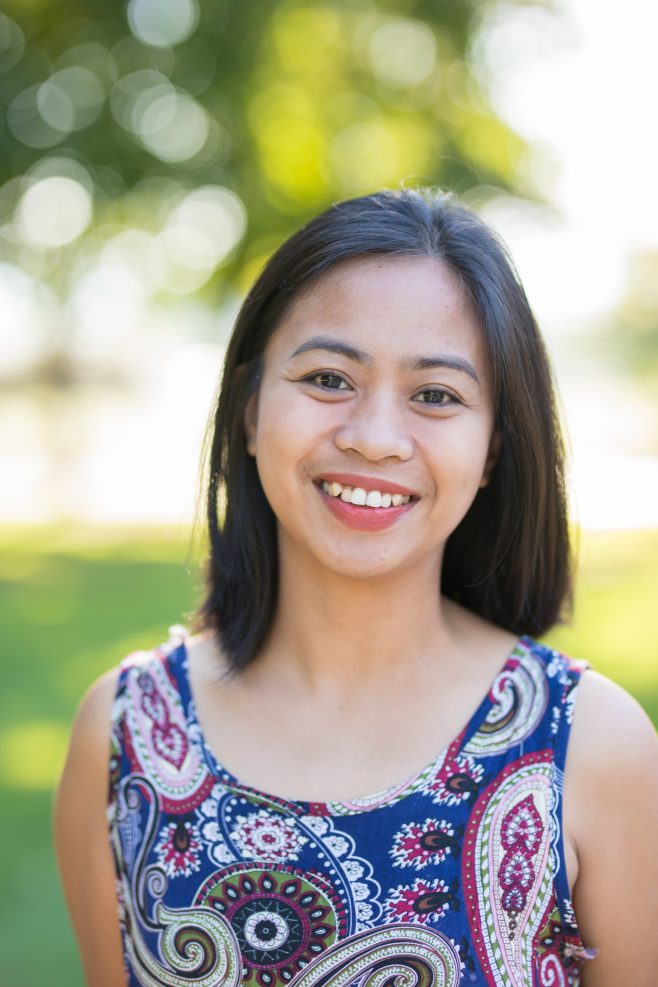
Growing up, I was taught to always pay my respect to the stewards of the land I find myself in. When I arrived on campus, I was introduced to the stewards of the school, the church, Harrisonburg community in general. I felt the warm embrace of the various communities here.
However, there was one community missing. I could not find a single indigenous person. My whole academic year, I only met one. He was a former EMU student decades ago who contributed much to the healing of indigenous youth using their cultural wisdom.
Before meeting him, the absence of the First Nations was a deafening silence for me especially because I have felt firsthand the meaning of invisibility in social spaces. It led me to research where they are. And I learned that the Shenandoah Valley in which Harrisonburg is situated was the hunting and trading ground of Algonquin (mostly Haudenosaunee), Siouxian (mostly Shawnee) and Muskogean, which includes Cherokee. However, in many places the Valley’s indigenous histories have been dismantled because archaeological sites were turned into Civil War forts or were bulldozed for so-called development.
This summer, a classmate and I visited the Monacan Nation, one of the indigenous people groups who once hunted and traded on these grounds. When we asked the chief what we could do as a response to the stories he shared to us, he said, ‘Tell anyone you meet that we exist.’
In my last year here as a student, I am doing my best to do what he told us. We invited the chief to the new students’ Grounding Day [a special CJP graduate student orientation] and he enjoyed the time so much. When we went to their Homecoming, I was introduced around as the one from the Mennonite university who invited the Chief.
[Now] I see our teachers being intentional in including indigenous authors in our curriculum and the hosting of events during Indigenous People’s Day [in October] …Prayerfully, we hope to see more sustained engagements within EMU to center indigenous issues. Because I believe it is what EMU and CJP are about — a faith-inspired community living out peace and justice. An academic community that supports students to serve others, to journey with the marginalized. Because having one voice missing is an injustice.
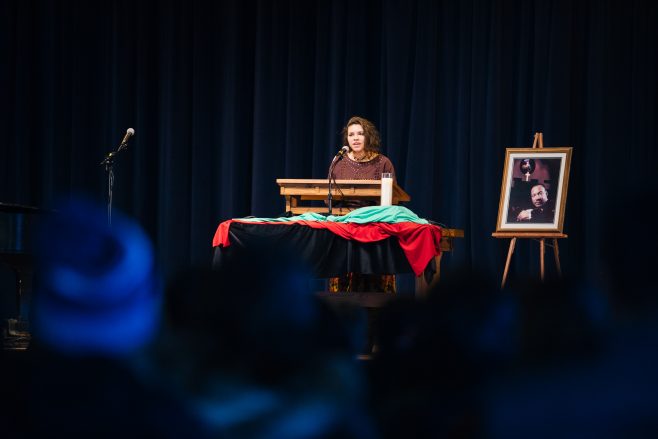
ARIEL BARBOSA
SENIOR BIOLOGY PREMED MAJOR
Reflecting on her cross-cultural to South Africa: The system, regime of apartheid that was socially engineered out of Dutch insecurity and fear that the black majority would overthrow and take power, is merely a created system. It is not real, true, or just. It tells a black person that they aren’t human, that their body is ugly and useless, that they aren’t able to move how and where they want to, able to educate themselves, govern themselves. So a shifted consciousness of the mind needed to happen within the black community to begin to unravel this and reveal truth.
I felt myself and those in my group going through a similar process. And this process of self-reflection broke us down, to tears sometimes, thinking about our ancestors and their struggles and wrongs, what we take for granted today, all the realities we can live our lives never having to see, reflecting on the interconnected struggles of people in South Africa and the US, reflecting on the human tendency to want security, comfort, control and therefore our own tendency to want these. Alive is the word I associate with this trip. I felt this deepest when with people like Phila, whose name means alive by the way. Being with people like the Khoisan indigenous man and educator I spontaneously met at a hostel.
Being with students who know thoroughly their peoples’ history, who protest at wrongs, who organize themselves and think grandly about the future of South Africa. South Africa is alive. I am so grateful for the opportunity to have been immersed in and transformed by it.
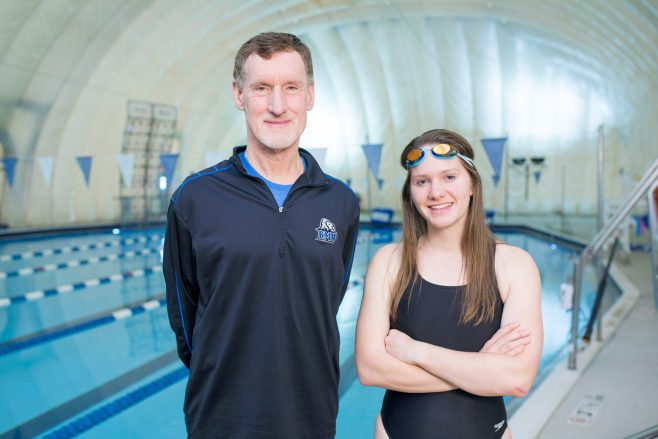
ABIGAIL SHELLY
SENIOR EDUCATION MAJOR
If I have learned anything as a student athlete [in triathlon, cross country and track], it is this: I need people and a community of support to help me keep my head on straight. I have coaches here that work hard to prioritize my mental and physical health, and I know that their door is always open for me to vent, talk about how my classes are going, or celebrate a successful race. I have teammates who pull me through workouts by cracking jokes and not letting on how bad I look in the moment. I even have a community that is enthusiastic and invested in the teams that I am a part of.
This was especially evident during our first home meet in 17 years that took place this September, as hundreds of classmates, professors, and community members cheered, screamed and held up handmade signs throughout the entire race. There is no way I could have tackled any athletic endeavor here alone. These people have sustained me and left lasting impacts during my time here at EMU … I know the transition from EMU to the real world will be difficult. However, I am confident that my experience as a student-athlete has laid a foundation that will propel me in my future steps, whether in the workplace, my role in the Mennonite church, or in a local 5k. What I have gained here through integrating athletics into my time at EMU has given me experiences that will only enrich my life going forward.
